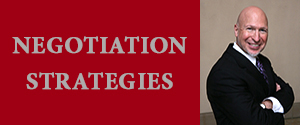

On occasion, as part of a client engagement, we might do an "audit" where we will observe our clients as they conduct a live negotiation. During these sessions, we are always struck by the same thing. This "thing" grates on our ears like a beautiful piece of opera sung atrociously off key. It assaults our senses mercilessly. It turns an elegant waltz into a grotesque and awkward stomp. What is this "thing" you ask? It is excessive, relentless, redundant, purposeless and aimless talking.
Often, negotiators perceive the negotiation process as being to persistently assert their demands, declare their positions and impose their proposals without any consideration of the other side's concerns or needs. They think that the more insistent they become the better negotiators they are. They believe that the only way to "win" is to continuously and repetitively state their positions without allowing their opponent to get a word in edge-wise. Oddly, they don't seem to realize that they are engaged in a terribly inefficient and unproductive process at best and a downright destructive one at worst.
Often, negotiators perceive the negotiation process as being to persistently assert their demands, declare their positions and impose their proposals without any consideration of the other side's concerns or needs. They think that the more insistent they become the better negotiators they are. They believe that the only way to "win" is to continuously and repetitively state their positions without allowing their opponent to get a word in edge-wise. Oddly, they don't seem to realize that they are engaged in a terribly inefficient and unproductive process at best and a downright destructive one at worst.



